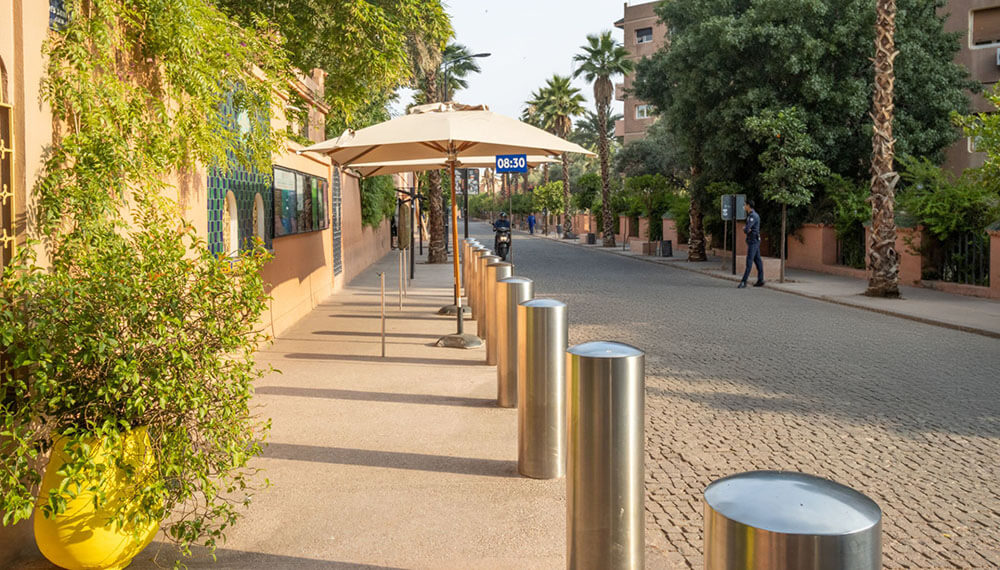Introduction
When navigating through bustling urban streets, you might overlook a critical element quietly safeguarding both pedestrians and infrastructure: street bollards. These sturdy, vertical posts are more than mere decorative features. They play an essential role in ensuring urban safety, managing traffic, and enhancing the aesthetics of public spaces.
- Bollards create safe zones for pedestrians, separating them from vehicular traffic.
- They act as physical barriers, preventing vehicles from mounting curbs or entering restricted areas.
- Their strategic placement helps guide traffic flow, minimizing accidents and congestion.
From a city planner’s perspective, bollards serve as silent guardians, maintaining order in busy streets and protecting vulnerable spaces from damage. For business owners, they enhance safety and even add a touch of style to storefronts.
By understanding what street bollards are and why they are important for urban safety, we can better appreciate their role in creating safer, more functional, and visually appealing cities.
Stay tuned as we dive deeper into the types of bollards, their applications, and their significance in urban safety.

What Are Street Bollards?
Street bollards are robust, vertical posts strategically installed in public spaces to serve various functions. While their designs may range from utilitarian to decorative, their primary goal is to enhance urban safety and organization.
Definition of Street Bollards
- Bollards are typically made from durable materials like steel, concrete, or high-grade polymers.
- They are designed to withstand environmental wear and vehicular impacts.
- Their purpose spans from traffic management to protecting pedestrian areas and landmarks.
Historical Context
- The origin of bollards dates back to maritime history when old cannons were repurposed as mooring posts for ships.
- Over time, these posts evolved to meet the growing need for urban safety as cities expanded and vehicular traffic increased.
- Today, bollards are pivotal in modern city planning.
Modern Applications
- Traffic management: Bollards guide vehicles and prevent erratic driving behaviors.
- Pedestrian safety: They create clear boundaries for safe walking zones.
- Infrastructure protection: Sensitive structures and landmarks benefit from bollard barriers.
- Aesthetic integration: Decorative bollards complement architectural themes while maintaining functionality.
Street bollards seamlessly blend practicality and design, making them a cornerstone of urban infrastructure. As we continue to prioritize safety and efficient city layouts, their importance becomes increasingly evident.
Types of Street Bollards
Street bollards come in various forms, each tailored to specific functions and environments. Their adaptability ensures that they address diverse needs, from traffic control to urban aesthetics. Below is a breakdown of the primary types of bollards and their applications.
Fixed Bollards
- Permanently installed for long-term use.
- Ideal for protecting buildings, pedestrian zones, and delineating restricted areas.
- Common materials include concrete and steel for maximum durability.
Removable Bollards
- Designed for temporary use, offering flexibility for events or emergency access.
- Can be locked in place when needed and easily removed to allow vehicle entry.
- Frequently used in areas requiring dynamic space utilization.
Retractable Bollards
- Equipped with mechanisms to lower or raise them as required.
- Often used in high-security zones, including government buildings and stadiums.
- Combine security with ease of access.
Decorative Bollards
- Focus on blending aesthetic appeal with functionality.
- Found in heritage areas, parks, and plazas to complement the architectural environment.
- Often made of cast iron or stainless steel with ornate designs.
Illuminated Bollards
- Feature built-in lighting to enhance visibility and safety at night.
- Commonly installed in pedestrian walkways, parking lots, and bike lanes.
- Serve both practical and visual purposes, guiding users while beautifying the area.
Flexible Bollards
- Constructed from materials like rubber or plastic that can bend upon impact.
- Used in areas with lower-speed traffic to minimize damage in case of accidents.
- Cost-effective and lightweight, making them easy to install and relocate.
Construction Bollards
- Temporary barriers placed at work zones to ensure safety.
- Help guide traffic away from hazardous areas and protect workers.
- Brightly colored for high visibility and equipped with reflective features.

Choosing the Right Bollard
Selecting the appropriate bollard depends on the specific needs of the location:
- For high-security areas, fixed or retractable bollards are recommended.
- Flexible or removable bollards work well in spaces requiring adaptability.
- Decorative bollards are ideal for enhancing the character of public spaces.
Each type of bollard plays a crucial role in promoting urban safety and efficiency, catering to unique challenges in different settings.
Why Are Street Bollards Important for Urban Safety?
Street bollards are indispensable in ensuring the safety and efficiency of urban environments. Their strategic placement addresses several key challenges faced by modern cities, providing practical and often life-saving solutions.
Traffic Management
- Bollards delineate vehicle lanes, keeping traffic orderly and reducing congestion.
- They serve as physical barriers to prevent vehicles from entering pedestrian zones.
- In busy intersections, bollards help guide both drivers and pedestrians, minimizing accidents.
Pedestrian Safety
- Create clear boundaries between sidewalks and roads, safeguarding walkers.
- Prevent vehicles from accidentally mounting curbs or colliding with foot traffic.
- Bollards in bike lanes protect cyclists and keep motorized vehicles out of their paths.
Infrastructure Protection
- Safeguard buildings, monuments, and critical infrastructure from vehicular damage.
- Bollards installed around historical landmarks prevent accidental or deliberate destruction.
- These barriers act as a shield, absorbing impacts and maintaining structural integrity.
Security Enhancement
- Anti-ram bollards provide high-level protection against vehicle-borne threats.
- Commonly used in sensitive locations like government buildings, airports, and stadiums.
- Increase privacy and safety in residential or commercial areas by restricting unauthorized access.
Traffic Calming
- Encourage drivers to slow down in high-risk areas, such as near schools or residential zones.
- Bollards act as visual cues, promoting cautious driving and reducing vehicle speeds.
- Temporary installations are used during events to control vehicular flow and prioritize pedestrian safety.
Deterring Vehicle Theft
- Bollards restrict vehicle access in parking lots and private driveways, reducing theft risks.
- Secure bicycle parking areas by providing sturdy locking points.
- Enhance the overall security of public and private spaces.
A Vital Component of Urban Design
Street bollards are not just functional; they also influence how we experience and navigate urban spaces. Their ability to combine safety, security, and traffic management makes them a crucial part of city planning. By addressing multiple challenges simultaneously, bollards contribute to creating cities that are both safe and efficient.

Street Bollards and Urban Aesthetics
While street bollards are primarily functional, their contribution to the aesthetic appeal of urban environments is equally significant. Modern city planning emphasizes the integration of safety measures with design elements, and bollards are an excellent example of this blend.
Enhancing Visual Appeal
- Decorative bollards are designed to complement architectural styles in various settings.
- In historical areas, cast iron bollards with ornate details maintain a heritage look while ensuring safety.
- Contemporary designs in stainless steel or sleek finishes bring a modern touch to urban landscapes.
Creating Cohesive Streetscapes
- Bollards help unify the look and feel of public spaces, tying together roads, sidewalks, and plazas.
- Their placement can highlight pathways, define spaces, and create visual order in busy environments.
- When paired with elements like benches, lighting, or landscaping, bollards enhance the functionality and beauty of the space.
Supporting Multi-Use Spaces
- Temporary decorative bollards can be installed for events or seasonal changes, adding flair while maintaining safety.
- In plazas and parks, bollards often double as seating elements or visual markers.
- Brightly colored or artistically designed bollards can serve as focal points, drawing attention and sparking community pride.
Future Trends in Design
- Smart bollards equipped with sensors and lighting contribute to sustainable urban planning.
- Eco-friendly materials, such as recycled composites, are being used to reduce environmental impact.
- Customizable bollards with unique designs allow cities to reflect their identity and culture.
Balancing Functionality and Beauty
Street bollards demonstrate that practical infrastructure need not compromise on design. By prioritizing both safety and aesthetics, they help cities become more livable, attractive, and inviting for residents and visitors alike.
FAQs About Street Bollards
Addressing common questions helps demystify the role of street bollards and their significance in urban environments. Here are answers to frequently asked questions:
1. Do Bollards Require Planning Permission?
- The need for planning permission depends on local regulations.
- Temporary installations like removable bollards may not require formal approval, while permanent fixtures often do.
- It’s advisable to consult local authorities or city planning departments before installation.
2. Can Bollards Stop High-Speed Vehicles?
- Specific types, such as anti-ram bollards, are designed to withstand impacts from high-speed vehicles.
- These are commonly used in high-security areas like embassies, airports, and government facilities.
- Standard bollards, however, are not always built for this level of protection.
3. What Is the Best Type of Bollard for Residential Use?
- Decorative bollards enhance curb appeal while providing basic safety and security.
- For driveway protection or traffic control, retractable or fixed bollards are ideal choices.
- Homeowners should consider their specific needs, such as vehicle restriction or visual appeal.
4. How Are Bollards Maintained?
- Regular inspections ensure that bollards remain functional and visually appealing.
- Materials like steel or concrete require occasional cleaning and repairs to prevent corrosion or wear.
- Flexible bollards might need frequent replacements in high-impact areas due to their softer material.
5. Can Bollards Be Customized?
- Many manufacturers offer customizable designs to match urban aesthetics or branding.
- Options include unique colors, logos, and materials tailored to the needs of the space.
- Customization ensures that bollards blend seamlessly into their surroundings.
Conclusion
Street bollards are more than just functional posts; they are integral to creating safer, more organized, and visually appealing urban spaces. By addressing what are street bollards and why are they important for urban safety, we uncover their significant impact on city planning and public safety.
- Bollards ensure pedestrian safety by separating walking areas from vehicular zones.
- They enhance traffic management and prevent accidents by guiding vehicles and calming traffic.
- Through their diverse designs, bollards contribute to urban aesthetics, blending functionality with beauty.
As cities continue to evolve, the role of bollards in shaping sustainable, secure, and efficient urban environments cannot be overstated. Whether safeguarding infrastructure, enhancing security, or simply adding charm to public spaces, street bollards are essential to modern cityscapes.


